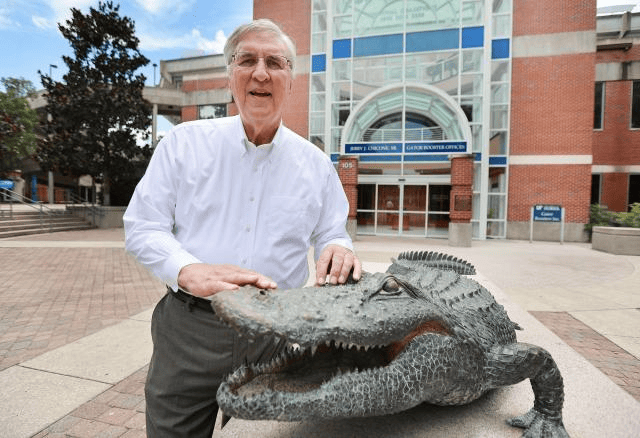Sad News: Another Florida Gator AD , who led the Gators on the field and from the front office, dies at….
 Former Gators’ AD and All-American Bill Carr dies at age 78
Former Gators’ AD and All-American Bill Carr dies at age 78
– Bill Carr, a football All-American, Florida Hall of Famer, Gators assistant coach, and the school’s athletic director, passed away at the age of 78. Carr, who died late on February 3, was reared in Pensacola but was born in Gainesville as the son of a Baptist minister. He went back to UF, where he became a star in his own right and quarterback Steve Spurrier’s center. During Spurrier’s 1966 Heisman season, he was named All-SEC and All-America. “Amazing guy, amazing friend, and a super Gator,” Spurrier described himself to the Orlando Sentinel. Spurrier reported that he had seen Carr in the last month following his discharge from the hospital following a multiple-week stay following a fall.
Spurrier recalls that “he was somewhat upbeat when I visited him.” “Orr is my middle name; he called me that all the time. And his name was William Curtis Carr, but I always called him Willie C. We everyone seemed to have had nicknames back then.However, he declared, “I’m ready if it’s my time to go to heaven.” I’m ready. It was as though he could nearly see it in the future.” Carr was selected in the fourth round by the New Orleans Saints in 1967. He then spent two years in the U.S. Army and coached at UF for three years (1972–1974) under Doug Dickey before moving into administration as Gators AD Ray Graves’ assistant.
In 1979, Carr replaced his former coach at age 33 to become the nation’s youngest AD in Division I and served in the position until 1986. At the same time, Jeremy Foley worked in Carr’s department and eventually became AD in 1992 to 2016. “Bill’s fingerprints are all over the foundation of this program,” Foley said in a statement. “I have a front-row seat to witness his impact and vision. He was one of my first mentors. I was so blessed to be on his staff.” From 1993-97, Carr held the same position at the University of Houston before he became a consultant on more than 200 projects on more than 100 colleges campuses. Carr’s son Scott is the AD at FIU, but his father became increasingly disillusioned by the current enterprise of college athletics. During the summer of 2021, Bill Carr spoke with the Orlando Sentinel about the uncertain impact and likely unintended consequences of Name, Image and Likeness legislation. “The intercollegiate athletic experience is not an enterprise that it is intended to be a financial endeavor,” he said. “That’s not the point of it. It’s antithetical and I disagree with it entirely.”  But Carr also acknowledged he and fellow administrators lacked vision decades ago when media rights began to generate millions of dollars that did not trickle down to athletes. Carr suggested a program providing lifetime health insurance, akin to what military-service people receive, would have been a worthy use of resources and a sign of good faith. “The NCAA should have studied that,” he said. Carr was incredulous about the increasing size of football staffs and budgets. Coach Billy Napier’s 2022 Gators, his first UF team, featured 116 players and 140 staff members in the team photo although many, Napier said, were UF undergraduate volunteers. “When you talk about increasing the number of people in your staff to over 55 people and you’re spending $5 million more on your support system, it is no longer a battle of skill and effort,” Car told the Sentinel. “It’s a battle of investment. It’s ridiculous to have so many people doing so many things in that football program.” Carr freely shared his opinions and insights but always supported the Gators. In 2015 at age 69, he served as the oldest “Honorary Mr. Two Bits” during UF’s season opener under former coach Jim McElwain. Carr told UF he saw George Edmondson performed his “Mr. Two Bits” routine prior to a game as a freshman, sitting alongside Spurrier. One former player from the 1970s recalled Carr’s impact on Black athletes while serving as Dickey’s academic supervisor, along with coaching and scouting duties. Speaking to the Sentinel about the football team’s integration under Dickey, former All-SEC safety Wayne Fields recalled that Carr had designed the Equal Education Opportunity Program.
But Carr also acknowledged he and fellow administrators lacked vision decades ago when media rights began to generate millions of dollars that did not trickle down to athletes. Carr suggested a program providing lifetime health insurance, akin to what military-service people receive, would have been a worthy use of resources and a sign of good faith. “The NCAA should have studied that,” he said. Carr was incredulous about the increasing size of football staffs and budgets. Coach Billy Napier’s 2022 Gators, his first UF team, featured 116 players and 140 staff members in the team photo although many, Napier said, were UF undergraduate volunteers. “When you talk about increasing the number of people in your staff to over 55 people and you’re spending $5 million more on your support system, it is no longer a battle of skill and effort,” Car told the Sentinel. “It’s a battle of investment. It’s ridiculous to have so many people doing so many things in that football program.” Carr freely shared his opinions and insights but always supported the Gators. In 2015 at age 69, he served as the oldest “Honorary Mr. Two Bits” during UF’s season opener under former coach Jim McElwain. Carr told UF he saw George Edmondson performed his “Mr. Two Bits” routine prior to a game as a freshman, sitting alongside Spurrier. One former player from the 1970s recalled Carr’s impact on Black athletes while serving as Dickey’s academic supervisor, along with coaching and scouting duties. Speaking to the Sentinel about the football team’s integration under Dickey, former All-SEC safety Wayne Fields recalled that Carr had designed the Equal Education Opportunity Program.  The effort helped minority freshmen and sophomores adjust to the rigors of academics in college, given many of the players came from high schools. Carr played for one of Florida’s first great teams and shared a unique bond with the program’s most recognizable figure in Spurrier. “I can’t remember if we ever had a bad exchange, quarterback/center, and of course we were underneath the while time,” Spurrier recalled. “I can’t remember us ever dropping one.” Carr also oversaw the program’s most tumultuous period. He the Gators’ AD in August 1984 when the NCAA placed Charley Pell’s football program on two years’ probation for admitting to 107 infractions, many involving recruiting inducements from boosters.
The effort helped minority freshmen and sophomores adjust to the rigors of academics in college, given many of the players came from high schools. Carr played for one of Florida’s first great teams and shared a unique bond with the program’s most recognizable figure in Spurrier. “I can’t remember if we ever had a bad exchange, quarterback/center, and of course we were underneath the while time,” Spurrier recalled. “I can’t remember us ever dropping one.” Carr also oversaw the program’s most tumultuous period. He the Gators’ AD in August 1984 when the NCAA placed Charley Pell’s football program on two years’ probation for admitting to 107 infractions, many involving recruiting inducements from boosters.
The infractions by Pell and his crew presumably would not have represented transgressions under NIL because the minimal laws in place ban coaches from arranging payments to players. Two years later, Carr transferred to the private sector and then relocated to Houston. Years later, when athletes are now eligible for compensation, he noticed some irony. “What happened with Charley Pell while I was there was illegal,” Carr stated. “It’s legal now. NIL stands for that, and it’s now permissible.”



